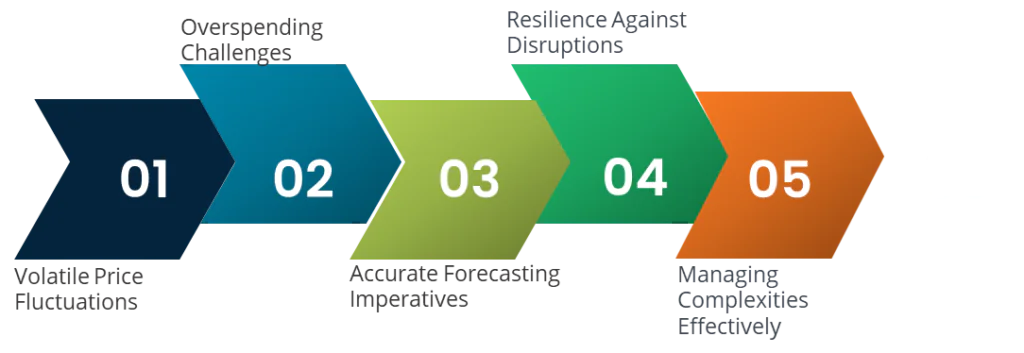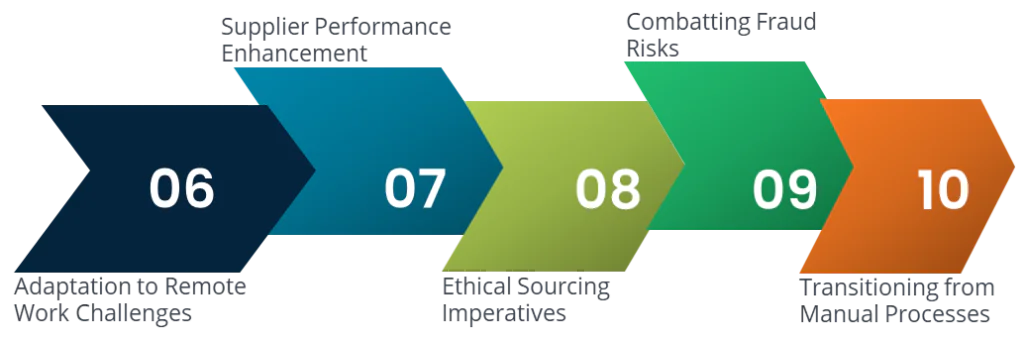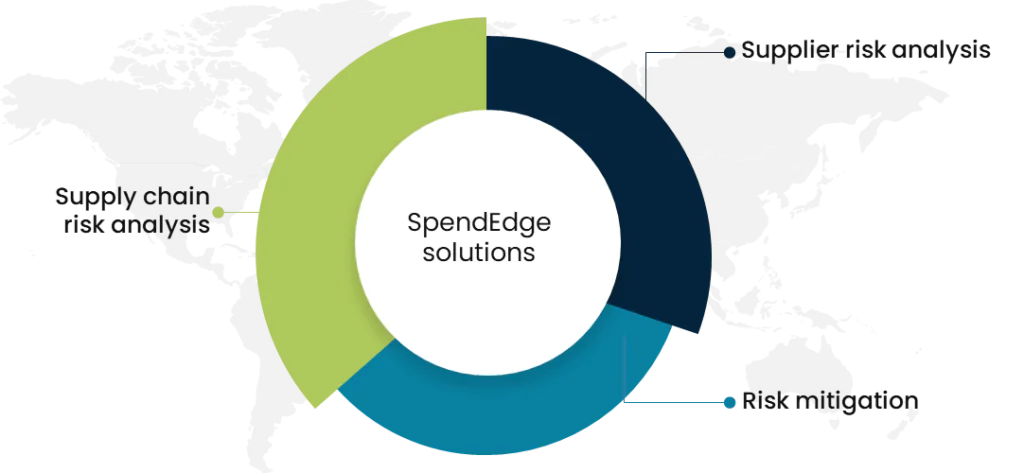Key takeaways
- Effective risk management in procurement is essential for safeguarding the organization’s financial stability, ensuring operational continuity, cultivating strong supplier relationships, and protecting brand reputation.
- Maintaining a flexible budget and adopt proactive negotiation strategies to counter unexpected cost increases while ensuring transparency and value in supplier relationships.
- SpendEdge offers tailored solutions for risk mitigation, supplier risk analysis, and supply chain risk analysis, providing organizations with comprehensive insights and strategies to enhance resilience and minimize the negative impact of risks on their operations and bottom line.
Navigating the complex landscape of procurement involves more than just acquiring goods and services—it’s about managing risks that could potentially derail your organization’s objectives. Procurement risk lurks in various forms, from financial setbacks to reputational damage and supply chain disruptions. Effective risk management in procurement entails not only identifying and assessing potential threats but also proactively mitigating them.
By implementing a robust procurement risk management (PRM) strategy, organizations can safeguard their interests, ensure smooth operations, and make informed decisions that lead to successful outcomes. Let’s delve into the intricacies of procurement risk management and explore how it serves as a cornerstone for achieving procurement goals and driving proactive decision-making.
The significance of risk management in procurement
Safeguards Financial Stability
Effective procurement risk management acts as a shield for your organization’s financial health. By proactively identifying and addressing potential risks associated with procurement processes, you can avoid unexpected expenses and maintain budgetary integrity. This ensures that your business remains financially resilient, even in the face of market fluctuations and supplier challenges.
Ensures Operational Continuity
The seamless flow of procurement activities is essential for maintaining operational continuity throughout your organization. Procurement-related risks, such as supplier disruptions or regulatory changes, have the potential to disrupt supply chains and halt critical operations. Through robust risk management strategies, you can develop contingency plans to mitigate these risks, ensuring uninterrupted business processes and sustained growth.
Cultivates Strong Supplier Relationships
Building and nurturing positive relationships with suppliers is key to a successful procurement strategy. Effective risk management demonstrates your commitment to collaboration and mutual success, fostering trust and reliability among suppliers. By actively managing risks and addressing challenges promptly, you can strengthen supplier partnerships, negotiate better terms, and enhance overall procurement efficiency.
Protects Brand Reputation
Procurement-related issues, such as product quality issues or supply chain disruptions, can quickly damage your brand’s reputation and erode consumer trust. By implementing rigorous risk management practices, you can minimize the likelihood of such incidents and safeguard your brand’s reputation. This proactive approach not only protects your organization’s image but also instills confidence among stakeholders and customers alike.
Exploring the Top Procurement Risks and Strategies for Resilience


Volatile Price Fluctuations
Within the supply chain market, price fluctuations pose a significant challenge for procurement functions. To address this, organizations must maintain a flexible budget and adopt proactive negotiation strategies to counter unexpected cost increases while ensuring transparency and value in supplier relationships.
Overspending Challenges
Implementing an e-procurement solution can revolutionize budget management by automating invoicing and purchase order processes. Organizations that embrace this technology gain real-time insights into budgets and spending, minimizing the risk of overspending, damaged vendor relationships, and unnecessary purchases.
Accurate Forecasting Imperatives
Inaccurate forecasting can lead to increased procurement costs and supply chain disruptions. Leveraging supply chain management (SCM) software enables organizations to collect accurate data for precise forecasting, ensuring timely procurement at optimal market prices.
Resilience Against Disruptions
Disruptions to the supply chain, including extreme weather events and geopolitical shifts, demand proactive resilience strategies. By diversifying suppliers and developing response plans, organizations can mitigate the impact of disruptions and maintain operational continuity.
Managing Complexities Effectively
Complex procurement projects present unique challenges that require clear communication and meticulous planning. Organizations must prioritize transparent communication channels and continuous evaluation of project demands to identify and address potential issues promptly.
Adaptation to Remote Work Challenges
In the era of remote work, effective collaboration with suppliers is essential for procurement functions. Establishing streamlined communication protocols and utilizing centralized platforms facilitate seamless collaboration, ensuring productivity and success in procurement operations.
Supplier Performance Enhancement
Vendor management systems offer valuable insights into supplier performance, enabling organizations to evaluate, rate, and compare suppliers effectively. By fostering strong partnerships and holding suppliers accountable, organizations can optimize performance and mitigate risks.
Ethical Sourcing Imperatives
In response to growing consumer demands, organizations must prioritize ethical and sustainable sourcing practices. Leveraging vendor management systems allows organizations to monitor supplier adherence to ethical standards and ensure alignment with corporate values.
Combatting Fraud Risks
Enhancing transparency and moving away from manual processes are crucial steps in mitigating procurement fraud risks. By adopting automated procurement solutions and implementing robust fraud detection measures, organizations can minimize the risk of fraudulent activities.
Transitioning from Manual Processes
Manual procurement processes pose inherent risks, including data entry errors and limited visibility. Embracing e-procurement platforms enables organizations to streamline processes, gain real-time insights, and enhance transparency across the supply chain, reducing operational risks significantly.
SpendEdge solutions: Market intelligence and risk management services

Risk Mitigation:
Risk mitigation is a proactive approach aimed at minimizing the impact of potential risks on an organization’s procurement operations and supply chain. At SpendEdge, we offer customized risk mitigation strategies designed to address specific challenges and vulnerabilities within the procurement process. Our team conducts thorough risk assessments to identify potential threats and vulnerabilities, followed by the development and implementation of targeted mitigation plans. By leveraging industry best practices and innovative solutions, we help organizations enhance their resilience and minimize the negative impact of risks on their operations and bottom line.
Supplier Risk Analysis:
Supplier risk analysis involves assessing the potential risks associated with engaging and partnering with specific suppliers or vendors. At SpendEdge, we conduct comprehensive supplier risk assessments to evaluate various factors, including financial stability, performance history, compliance with regulations, geopolitical risks, and reputational issues. Our team utilizes advanced analytical tools and methodologies to analyze supplier data and identify potential red flags or areas of concern. By gaining insights into supplier risks, organizations can make informed decisions when selecting, onboarding, and managing suppliers, thereby reducing the likelihood of supply chain disruptions and financial losses.
Supply Chain Risk Analysis:
Supply chain risk analysis involves evaluating the vulnerabilities and potential disruptions within an organization’s supply chain network. SpendEdge offers robust supply chain risk analysis services aimed at identifying and assessing various risk factors, such as natural disasters, geopolitical instability, demand fluctuations, transportation disruptions, and cybersecurity threats. Our team conducts comprehensive risk assessments across the entire supply chain ecosystem, from raw material suppliers to distribution channels, to identify potential points of failure and develop risk mitigation strategies. By proactively addressing supply chain risks, organizations can enhance their resilience, minimize disruptions, and ensure continuity of operations.
For more information
Conclusion
Effective risk management in procurement is imperative for organizations to achieve their objectives and sustain long-term success. By proactively identifying, assessing, and mitigating potential risks across the procurement process, organizations can safeguard their financial stability, ensure operational continuity, foster strong supplier relationships, and protect their brand reputation. Strategies for resilience, including leveraging technology, enhancing communication, monitoring supplier performance, and prioritizing ethical sourcing practices, are essential for mitigating various procurement risks. Through tailored solutions and specialized services like those offered by SpendEdge, organizations can enhance their resilience, minimize disruptions, and achieve their procurement goals with confidence in an increasingly uncertain world.




